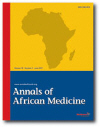
|
Annals of African Medicine
Annals of African Medicine Society
ISSN: 1596-3519
Vol. 4, No. 4, 2005, pp. 177-179
|
 Bioline Code: am05044
Bioline Code: am05044
Full paper language: English
Document type: Research Article
Document available free of charge
|
|
|
Annals of African Medicine, Vol. 4, No. 4, 2005, pp. 177-179
| en |
Syphilis in a Nigerian Paramilitary Agency: Need for Treatment Policy
Nwokedi, E. E.; Iliyasu, Z.; Dikko, A. U.; Azeez, A. O & Mohammed, B.
Abstract
Background:
Sexually transmitted diseases are widespread in the developing countries and constitute a major public health problem in Sub-Saharan Africa. More recently, there has been a resurgence of syphilis. The aim of this study was to determine the seroprevalence rate of syphilis among newly recruited senior cadres of a Nigerian Security Agency.
Method:
Eight hundred and fifteen newly recruited men and women sent for serological test for syphilis (STS) in our laboratory were all screened accordingly using Rapid Plasma Reagin (RPR) test. All those that were positive wee confirmed using treponema pallidum haemagglutination (TPHA) test.
Results:
The seroprevalence rate of treponema pallidum infection was 4.0% (95%CI = 2.8% -5.6%). The rate was significantly higher among women (8.0%) compare to men (3.4%) (χ2 = 5.3 df = 1 P = 0.02). Considered by age, the highest seroprevalence of 6.7% was seen among oldest recruits (30-39) years age group compared to 4.2% among the younger ones. This trend was however, not statistically significant (χ2trend = 1.6 df =3 P = 0.20).
Conclusion:
Syphilis seropositivity is highly prevalent among the paramilitary population hence the need for prophylactic treatment with benzathine penicillin to be instituted for seropositive individuals as a matter of policy by the government. This could reduce the incidence of HIV infection among Nigerians.
Keywords
Syphilis, sexually transmitted diseases, seroprevalence
|
| |
| fr |
Nwokedi, E. E.; Iliyasu, Z.; Dikko, A. U.; Azeez, A. O & Mohammed, B.
Résumé
Contexte:
Les maladies sexuellement transmissibles sont largement répondues dans les pays en développement et constituent un problème majeur de santé publique en Afrique sub-Saharienne. Plus récemment il y'a recrudescence de la syphilis. Le but de cette étude était de déterminer le taux de séroprévalence de la Syphilis chez des cadres supérieurs nouvellement recrutés au sein d'une Agence Nigériane de Sécurité.
Méthodes :
Huit cents quinze hommes et femmes nouvellement recrutés ont bénéficié d'une sérologie syphilitique dans notre laboratoire en utilisant le test rapide RPR (Rapid Plasma Reagin). Tous les tests positifs ont été confirmés par le test de treponema pallidum haemagglutination (TPHA).
Résultats:
Le taux de séroprévalence de l'infection à treponema pallidum était de 4,0% (95%CI=2,8%-5,6%). Le taux était significativement plus haut chez les femmes (8,0%) comparé aux hommes (3,4%)(χ2 = 5.3 df = 1 P = 0.02). Concernant l'âge, les taux de séroprévalence les plus élevés étaient retrouvés parmi les sujets les plus âgés (30-39) comparés à 4,2% chez les sujets les plus jeunes. Cette tendance n'est pas toutefois pas statistiquement significative (χ2trend = 1.6 df =3, P = 0.20).
Conclusion:
La Séropositivité syphilitique a une grande prévalence dans la population de paramilitaires, d'où la nécessité d'une prophylaxie par de la benzathine penicillin, qui doit être instituée pour les sujets séropositifs devant l'absence de stratégie gouvernementale. Cela pourrait réduire l'incidence de l'infection à VIH au Nigeria.
Mots Clés
Syphilis, maladie sexuellement transmissible, séroprévalence
|
| |
© Copyright 2005 - Annals of African Medicine
Alternative site location: http://www.annalsafrmed.org
|
|
